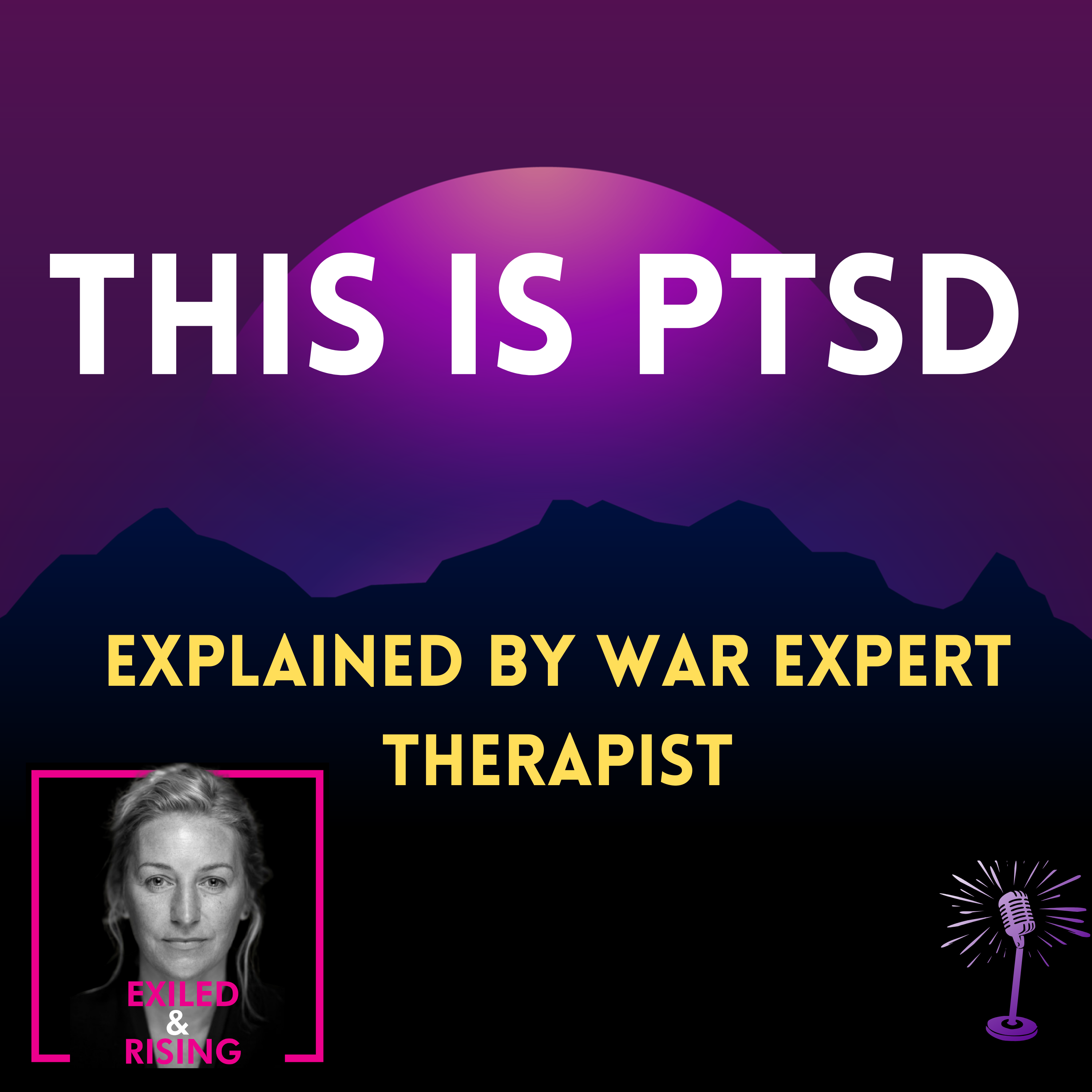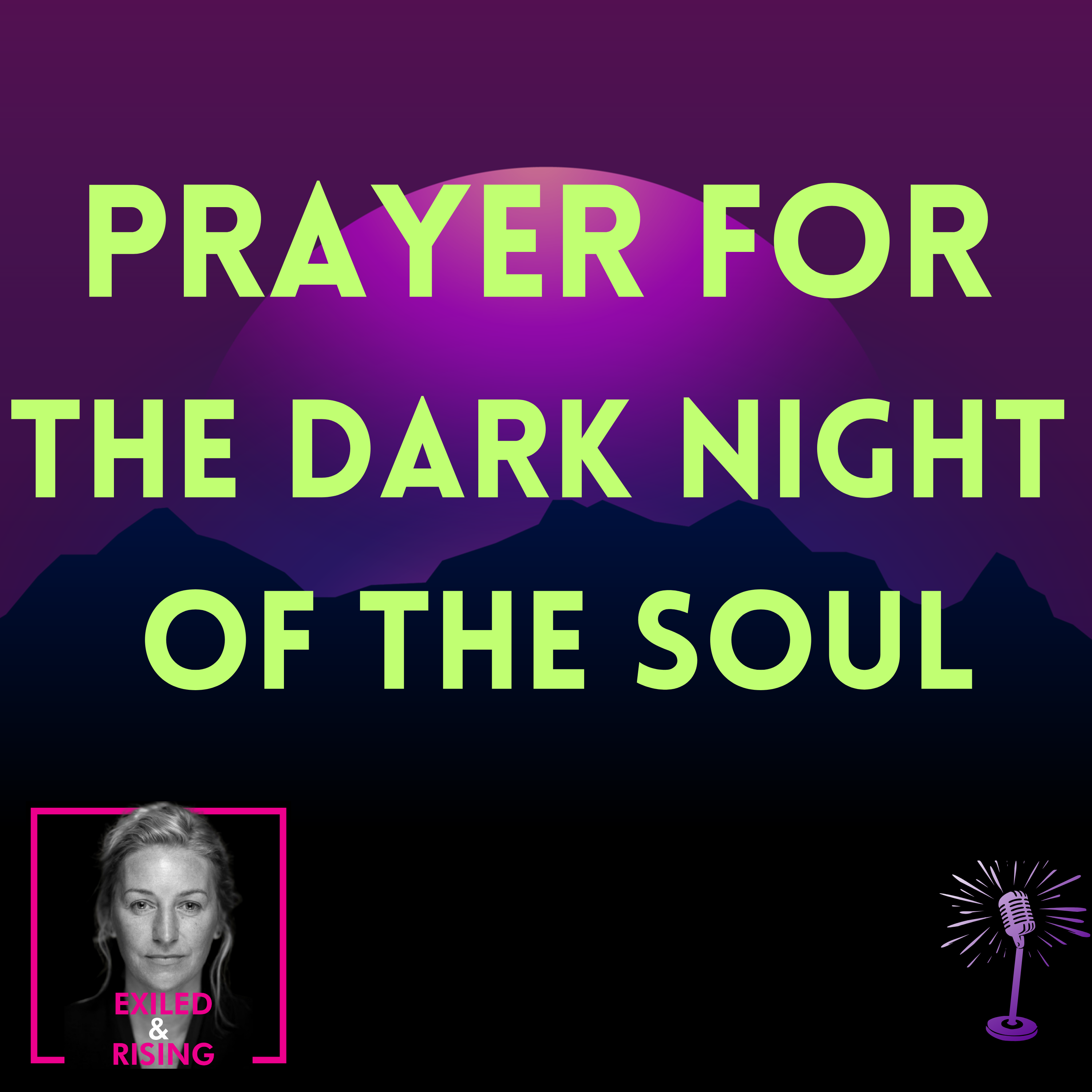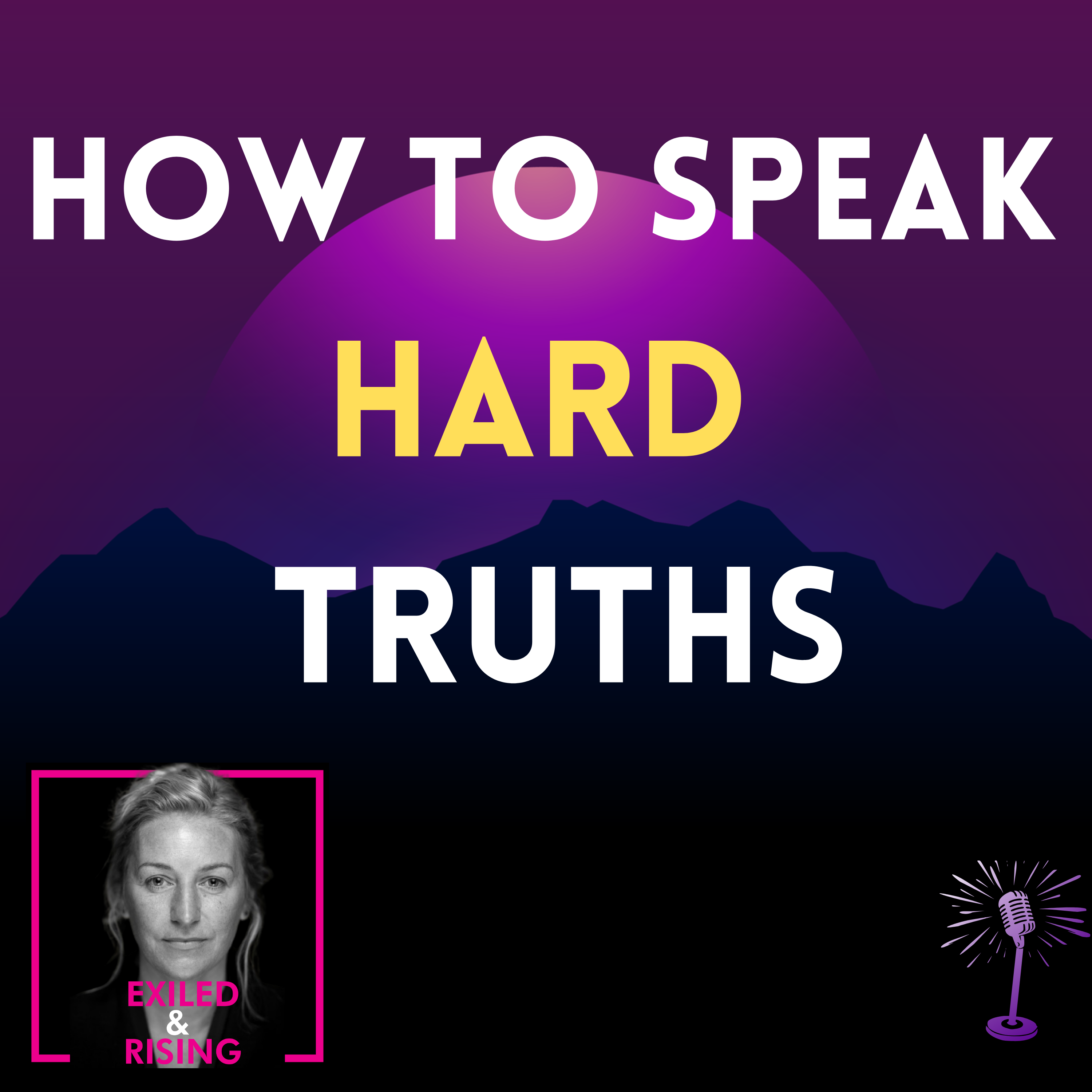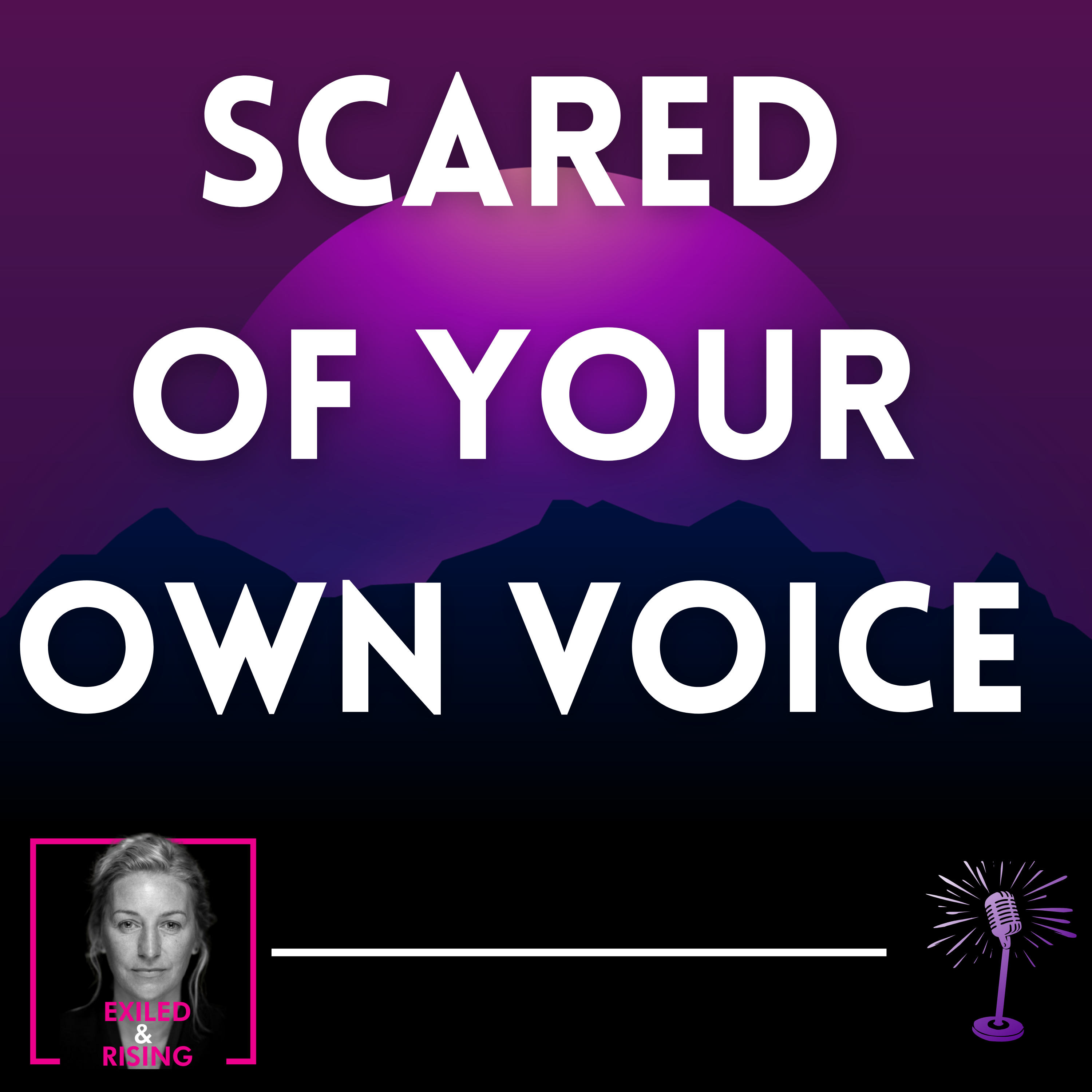Episode Transcript
[00:00:00] You cannot lie to your survival detectors.
[00:00:06] So that's why I'm saying you cannot positive think your way out of this.
[00:00:14] So you cannot bullshit your survival detectors.
[00:00:18] They're here to protect you. And there is a deep wisdom, um, in your primal brain.
[00:00:25] Right.
[00:00:26] Deep wisdom.
[00:00:28] They feel like they're failing deeply failing even on their healing journey.
[00:00:35] Because everyone is success.
[00:00:39] No, no, what you see is pretense. It's not success.
[00:00:49] It's not.
[00:00:52] So let's talk about the trauma. We don't talk about.
[00:00:59] Ease does not exist.
[00:01:04] Ease does not exist in the trauma body.
[00:01:08] Nothing is easy.
[00:01:12] There is no ease even in simple or enjoyable task.
[00:01:19] It doesn't exist.
[00:01:22] Going on vacation is not easy.
[00:01:25] Having a friend over for dinner is not easy.
[00:01:30] Taking your kids to the park is not easy.
[00:01:37] Playing games with colleagues to break the ice is not easy.
[00:01:43] The simplest task from the outside is a freaking nightmare inside of a trauma body.
[00:01:54] A casual, effortless, carefree state is not present in the trauma body.
[00:02:04] There is only high alert, constant overthinking and preparing for the worst case scenario.
[00:02:16] You always feel like something bad is about to happen, and that is a constant in the PTSD mind.
[00:02:28] You prepare yourself to be attacked, ashamed, terrified already, uh, right this second, to save lives.
[00:02:44] Because your child could break their neck and die, or a truck could crash you, leaving you lifeless on highway, or your friend could choke with eating pie and die at your dinner table.
[00:03:02] Easy just doesn't exist in our PTSD body.
[00:03:10] It doesn't exist.
[00:03:12] Alertness exists.
[00:03:14] Preparedness exists.
[00:03:17] Imagining scenarios worse than horror films exist.
[00:03:25] Living in a state of, of, uh, a constant hyper vigilance.
[00:03:31] There's some unwanted unsafe thing is about to happen.
[00:03:41] Exist.
[00:03:43] Just as it did so many times in our past.
[00:03:49] You can't shake it off.
[00:03:51] You can't read enough meditate, enough journal, enough exercise, enough work, enough unease, uh, resides inside our trauma body.
[00:04:08] There is no peace of mind.
[00:04:12] And this is the life with ptsd.
[00:04:28] So we will talk about, about this piece.
[00:04:36] So let's just take a moment. Just, just pause. Just pause.
[00:04:42] Just pause and notice what's inside.
[00:04:47] Uh, and I share my experience and experience of everyone who lives with ptsd.
[00:04:58] Yeah.
[00:05:02] So with this piece, I want to dismantle the myth that everyday task should feel simple or light.
[00:05:13] Once you're on a healing journey, or once your partner who doesn't have a PTSD or your friend is on healing journey and is expecting from your body to respond in a way that person, your partner, thinks it should be the right healing, spiritual way to do that. Okay, so for those of us living with ptsd, ease is not naturally available.
[00:05:52] Not because we are doing something wrong, but because our nervous system is calibrated to detect danger, not safety.
[00:06:05] 24 7, this primal brain is on it.
[00:06:13] So this is not a mindset problem.
[00:06:15] It's somatic. Uh, truth, Right? This is our soma. This is our body, and it's very real.
[00:06:24] It's very real in your biology if you're living with ptsd.
[00:06:29] Okay, so what we are learning here, number one, the trauma body cannot rest.
[00:06:39] Okay? So I'm calling this trauma body where we live, okay?
[00:06:43] Body who carries PTSD and tasks, uh, that seems relaxing or joyful for others, like going to the park or sharing a meal, truly feels like life or death events.
[00:07:02] For a person who carries trauma inside, small acts can trigger catastrophic scenarios in the trauma mind.
[00:07:17] The simplest task from the outside is a freaking nightmare inside of a trauma body.
[00:07:28] So can we just normalize and please share this.
[00:07:34] If you're living with partner who doesn't have a PTSD and he wants to know you, share this. Share this video. Okay? They need to know how you live. They need to know.
[00:07:49] They need to know your landscape.
[00:07:58] Second, hyper vigilance replaces ease.
[00:08:05] So instead of peace or being spontaneous, let's be spontaneous. That doesn't exist in trauma mind.
[00:08:19] The trauma, especially you soldiers, veterans, first responders, police officers. If you're a victim of a gun violence, if you have been living with someone with rage, raging fathers, mothers, bullying, moods ranging from extreme rage, unpredictable behavior. Right?
[00:08:54] So that the trauma body exists in a state of preemptive catastrophe.
[00:09:03] So trauma body lives and exists in a state of something bad, and something really bad is about to happen.
[00:09:17] And by bad, I don't mean, oh, I will miss my manicure or my car will break. No.
[00:09:30] So it's living in a state.
[00:09:35] Theory will happen, horror will happen, catastrophe will happen.
[00:09:39] So it's a, uh, constant alertness, imagining disasters, over analyzing social settings.
[00:09:49] Who.
[00:09:50] Why don't we socialize?
[00:09:53] Because it's so exhausting even, um, to go in the state of analysis.
[00:10:00] What you need to say, where you need to sit.
[00:10:05] What do I need now to do with my hands? Like, what do I do with my hands?
[00:10:13] What do I need to do with my hands? What's the next thing I have to say?
[00:10:17] Okay, so preparing for shame, injury or death.
[00:10:26] That's our life there. You always feel like something bad is about to happen.
[00:10:38] Yeah, that's our state.
[00:10:44] Third, we are living in the space of living there. Something bad is about to happen.
[00:10:55] About to happen.
[00:10:59] And that is our, uh, realm, that is our planet, that is our, for now, psychological ground we are walking on.
[00:11:09] And we did for years, for decades.
[00:11:16] For decades.
[00:11:18] So can we just normalize this space?
[00:11:28] Not to make. Not to make. This is okay or healthy place to be.
[00:11:35] It's so exhausting.
[00:11:38] As I wrote, nothing is easy. No one wants to be in that place.
[00:11:43] But can we normalize for people with ptsd, with complex trauma, that this is where we live, in a space where something bad is about to happen.
[00:12:06] And I just really want to hold that because this is not easy.
[00:12:13] It's not easy.
[00:12:16] And I want to acknowledge, uh, that space and I want to validate reality.
[00:12:31] It's very real.
[00:12:34] It's very real.
[00:12:37] And I don't want you to feel any shame.
[00:12:45] Any shame. That's why I want to normalize this because there is so much stigma, uh, there is so much expectation.
[00:12:56] If you scroll down, um, on socials, oh my God, everyone is having the moment of epiphany and spirituality. Everything is blissful. Everything is who?
[00:13:14] Everyone is spiritual diva.
[00:13:17] You know, it's a bullshit.
[00:13:24] Everyone is spiritual success.
[00:13:28] Mindfulness success.
[00:13:30] No, actually no.
[00:13:34] All the therapists can confirm that everyone who is sitting with a client face to face can speak the truth of this reality of real life, not social media life, a life of pretense. So I wanna really, for you, if you can just receive.
[00:14:03] This is the psychological ground I'm walking on because of what happened to me. And that doesn't mean I will live like that for the rest of my life. No, you will not.
[00:14:18] Okay. If you want to straight jump to the lesson, the link is in the show note. Okay?
[00:14:26] It's a big class. It's a big, It's a big flagship program about PTSD recovery. I'm running that class. Check the links in the show notes. Okay. Distilled lessons. Not overwhelmed, not fluff, not 500 hours and PDFs of noise. Mhm.
[00:14:48] Okay, so for it, this state is somatic, it's not mental. So I'm some. I am somatic experiencing therapist for PTSD and trauma recovery.
[00:15:05] One place I know very well is soma. It's your body.
[00:15:11] Okay?
[00:15:13] Also, I'm founder of Somatic Trauma Recovery Center. You can check the links below and see what we teach, what I teach.
[00:15:23] So this state where we live in, in our soma, in our body, right?
[00:15:30] The state is somatic, it's not mental.
[00:15:34] You can positive think your way out, out of ptsd.
[00:15:41] No amount of journaling, meditating or reading or uh, running to retreats, doing the plant medicine will fix this revival system on its own.
[00:15:59] So is meditating, journaling, self care.
[00:16:06] Your ritual is. Is important. Absolutely. I'm not denying that.
[00:16:15] But before that, there's one big step before that, okay?
[00:16:24] Your healing, your regulation starts with your soma, your body.
[00:16:31] And you cannot.
[00:16:33] You cannot lie to your survival detectors.
[00:16:40] So that's why I'm saying you cannot positive think your way out of this.
[00:16:49] Because what's happening now, with many people with complex trauma and ptsd, they feel like they're failing deeply. Failing even on their healing journey.
[00:17:02] Because everyone is success.
[00:17:06] No, no, what you see is pretense. It's not success.
[00:17:16] It's not.
[00:17:19] Or they can run on that dopamine high, right?
[00:17:23] Just after, uh, 50th retreat of this year, and it's only July.
[00:17:30] They can run on that high for a couple of weeks. But what will happen? What will happen?
[00:17:37] Your survival brain, right? That detector for next bad thing. What will happen because it still lives in that state of trauma, right? Will be on again.
[00:17:54] Okay?
[00:17:56] So you cannot. Your survival detectors, they're here to protect you. And there is a deep wisdom in your primal brain.
[00:18:07] Right?
[00:18:09] Deep wisdom.
[00:18:10] So I want to advocate on behalf of the often misunderstood trauma body of all people with ptsd.
[00:18:22] And I want to validate, especially for those who feel broken or ashamed for struggling with simple task.
[00:18:31] Simple task as having your friends over for dinner can make you hyper vigilant where you're not even enjoying that dinner when you're so rewhond going on vacation. Packing things is a, uh, big trigger for so many act of moving.
[00:18:54] It's not act of going on vacation deeply triggering going on any social event.
[00:19:03] So can we do something countercultural?
[00:19:07] Counter social media trends.
[00:19:12] So don't let anyone comfort you or fix you with a false hope.
[00:19:23] With what's trending.
[00:19:25] Your trauma cannot be healed with what's trending on social media.
[00:19:34] With something. What's buzzy.
[00:19:41] We know all those buzzwords.
[00:19:44] No, your healing starts only with the truth.
[00:19:51] Only with talking about the trauma we don't talk about.
[00:19:59] Okay?
[00:20:02] So we can normalize and expand that capacities in our nervous system.
[00:20:09] And once we do that, okay, the steps. How we will do that is in my teachings. The link is below.
[00:20:18] But once you expand these capacities, your system will not fight that.
[00:20:26] It will not. This will be a base ground where you start your next step, right?
[00:20:33] There is no fighting. There is no shaming. There is no internal struggle. There is no internal condemning. There is no hiding. There is no. Hyper continuously state of hyper control.
[00:20:47] Hyper managing hyper alertness. Right.
[00:20:54] So here is a couple of the truths we need to start. What do we need to know?
[00:21:01] So what do we need to know? Ease does not exist in the trauma body. It does not exist.
[00:21:09] Not because you're not trying hard enough.
[00:21:13] So share this with your partner or a friend who doesn't get you.
[00:21:21] Especially someone who is passing aggressive you or who makes you feel as something is off with you. Share this with them.
[00:21:30] Okay.
[00:21:32] Ease does not exist in the trauma, um, body.
[00:21:36] Not because you're not trying hard enough. Oh, uh boy. We know how we are trying so hard enough.
[00:21:43] Not on a daily basis, on an hourly basis.
[00:21:49] And many on a minute to minute basis.
[00:21:57] If you're that one, I just want to bow to you because I know that place of living from minute to minute.
[00:22:13] And there is a way out of it. There is a way out of it. Absolutely. There is a way out of it.
[00:22:21] Okay.
[00:22:27] If I did it, if many people did it.
[00:22:34] Yeah.
[00:22:36] Yes you can.
[00:22:41] And we start with the truth.
[00:22:43] So let me repeat this.
[00:22:46] Ease does not exist in trauma body.
[00:22:50] Not because we skipped steps in our healing, but because our bodies were wired for survival, not for safety.
[00:23:02] So even the trauma abuse is over. War is over.
[00:23:08] Shock trauma is over.
[00:23:11] Our body is still in that place of survival.
[00:23:14] Okay? So we will build that safety.
[00:23:19] We all know, we all know normal living is not easy. Trauma is like. Yeah, we can go back to the place of trauma much faster than to the place of normal living. Right.
[00:23:35] Second, second, spiritual bypassing.
[00:23:42] We live in a culture that tell us if you just meditate more, if you do more yoga, if you do more retreats, if you're more spiritual, if you feel the line, you will feel peace.
[00:23:56] But here's the truth. Peace is not only your mindset, it's your nervous system state. It's a state of your brain.
[00:24:10] It's a place of your prefrontal cortex here where you can regulate with self, uh, with others, with environment.
[00:24:24] There is no peace in activated primal brain.
[00:24:30] And if you live with complex trauma and ptsd, your nervous system may um, not have ever known these.
[00:24:40] And you will get to know that place bit by bit. Bit by bit.
[00:24:48] So it takes both finding your peace in your nervous system and also using the tools as meditation and journaling and your self care rituals. Okay?
[00:25:06] Third.
[00:25:09] Third truth about this place.
[00:25:13] This isn't about being dramatic, it's about being honest.
[00:25:22] And what's truth? Here is the trauma body replaces ease with hyper vigilance.
[00:25:33] With worst case, Scenarios, thinking with tight muscles, with shallow breath, and that constant voice, right, alert voice, telling us something bad is about to happen.
[00:25:53] And that replacement didn't happen because we were bored.
[00:25:57] Because you're not spiritual enough. Because you're not intelligent enough. Actually, we are very much spiritual and intelligent because when we are about to get killed, there is only God and spirit who saved us. Okay? So don't let anyone to dismiss you or look down on you. Don't take that bullshit from others, okay?
[00:26:25] That's a big hard no.
[00:26:29] Someone shaming your place where you live in your PTSD body.
[00:26:36] Okay?
[00:26:38] So this is not, uh, because you're not enough.
[00:26:43] It is because your body is still doing what it had to do to keep you alive.
[00:26:53] It is remembering the war zone, literal and emotional for many both.
[00:27:02] It remembers that place you live through.
[00:27:08] And it hasn't been shown enough evidence yet that is safe to pause.
[00:27:23] True.
[00:27:24] Okay, how do we do that?
[00:27:27] Check my teachings in the links below.
[00:27:35] So, no, you cannot positive think your way out of this. You can't channel it away. You cannot shame it into stillness, force it into stillness.
[00:27:52] Because unease, uh, doesn't live in your thoughts.
[00:28:01] It feels like it's in your thoughts. But that's the last product where survival lives. It lives in your fascia, in your breath, in your reflexes, okay?
[00:28:15] It's in your bones. It's in this sensation in your body. It's somatic. It's very intelligent. It's so intelligent.
[00:28:29] Who.
[00:28:33] Because life will happen and you know you have that in. In you. That's a big, big wisdom.
[00:28:43] I cannot say gift, because wisdom is earned.
[00:28:47] It's earned very hard way.
[00:28:50] So you want that access pain.
[00:28:57] I would rather have that than being in a state of complete collapse and panic when life happens and you don't know how to react.
[00:29:18] Okay, so that's good side of living with complex trauma.
[00:29:30] So that part deserves witnessing.
[00:29:33] Witnessing, welcoming, befriending into your biology. Okay?
[00:29:38] Doesn't need fix. It doesn't need transformation. In one day. It cannot happen.
[00:29:49] And many times there is no ease. And that doesn't mean failure. It means your body is still trying to protect you.
[00:30:02] Okay?
[00:30:03] So the work is not to chase peace, to get there there, chase there by running away from ptsd.
[00:30:16] Okay, so let me repeat this.
[00:30:22] It is to build the micro moments where we are not running toward that place of safety. No, no, no, no. Running is over.
[00:30:37] So we are building those moments.
[00:30:40] Normal living is the most hard thing to do for the client in a therapy.
[00:30:47] Absolutely everyone who was in war unfortunately, now we have so many people coming from the world.
[00:31:00] Therapists are overwhelmed. They don't know what to do.
[00:31:04] What do you do now? For the first time, client is coming from the world.
[00:31:09] You didn't learn that? You didn't have any clinical studies about that?
[00:31:17] Soldiers, veterans, refugees, displaced people. Oh, my God.
[00:31:24] We know normal life is not easy going back to the war.
[00:31:30] Oh, boy. We know what to do.
[00:31:39] Okay, so building that micro moments of normal life.
[00:31:47] We are not running from bullets, from raging voice, from someone who is discriminating us, uh, shaming us, bullying us.
[00:32:03] So you're not failing. You're adapting.
[00:32:07] And your body is still carrying you through. And this is not a weakness. It's very. It's a sacred survival.
[00:32:16] And yes, you will find your ease in more and more moments. You will.
[00:32:26] I did. Many did.
[00:32:30] And you have that capacity too. You do.
[00:32:44] So check the lessons below. And as always, be gentle with yourself. Be gentle with yourself. Um, I'm Anna. Mile.
[00:32:55] Follow. Excellent. Rising.
[00:32:58] Share support.
[00:33:00] Check the links below.
[00:33:04] Much care.
[00:33:06] Much care.



